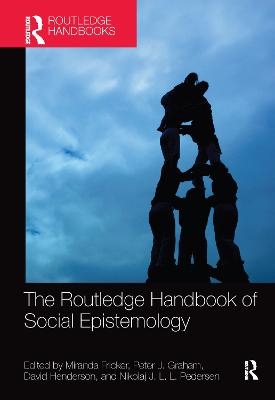
The Routledge Handbook of Social Epistemology
Routledge (Verlag)
978-1-032-09098-6 (ISBN)
Edited by an international team of leading scholars, The Routledge Handbook of Social Epistemology is the first major reference work devoted to this growing field. The Handbook’s 46 chapters, all appearing in print here for the first time, and written by philosophers and social theorists from around the world, are organized into eight main parts:
Historical Backgrounds
The Epistemology of Testimony
Disagreement, Diversity, and Relativism
Science and Social Epistemology
The Epistemology of Groups
Feminist Epistemology
The Epistemology of Democracy
Further Horizons for Social Epistemology
With lists of references after each chapter and a comprehensive index, this volume will prove to be the definitive guide to the burgeoning interdisciplinary field of social epistemology.
Miranda Fricker is presidential professor of philosophy at The Graduate Center, City University of New York. Her research is primarily in ethics and social epistemology with a special interest in virtue and feminist perspectives. She is the author of Epistemic Injustice: Power and the Ethics of Knowing (2007); co-author of Reading Ethics: Selected Texts with Interactive Commentary (2009); and co-editor of a number of edited collections, the most recent of which is The Epistemic Life of Groups: Essays in the Epistemology of Collectives (2016). She is an associate editor of the Journal of the American Philosophical Association and a fellow of the British Academy. Peter J. Graham is professor of philosophy and linguistics at the University of California, Riverside, where he also served as associate dean for arts and humanities. He specializes in epistemology and related areas in the philosophies of psychology, biology, and the social sciences. He is associate editor of the Journal of the American Philosophical Association and the co-editor of Epistemic Entitlement (2019). David Henderson is Robert R. Chambers distinguished professor of philosophy at the University of Nebraska, Lincoln. He teaches and writes primarily in the fields of epistemology and the philosophy of the social sciences. He is the co-author, with Terry Horgan, of The Epistemological Spectrum: At the Interface of Cognitive Science and Conceptual Analysis (2011) and co-editor, with John Greco, of Epistemic Evaluation: Point and Purpose in Epistemology (2015). Nikolaj J. L. L. Pedersen is associate professor of philosophy at Underwood International College, Yonsei University, and is the founding director of the Veritas Research Center, also at Yonsei University. He is co-editor of New Waves in Truth (2010), Truth and Pluralism: Current Debates (2013), Epistemic Pluralism (2017), and Epistemic Entitlement (2019).
| Erscheinungsdatum | 01.07.2021 |
|---|---|
| Reihe/Serie | Routledge Handbooks in Philosophy |
| Verlagsort | London |
| Sprache | englisch |
| Maße | 178 x 254 mm |
| Gewicht | 893 g |
| Themenwelt | Geisteswissenschaften ► Philosophie ► Erkenntnistheorie / Wissenschaftstheorie |
| Geisteswissenschaften ► Psychologie ► Sozialpsychologie | |
| Sozialwissenschaften ► Pädagogik ► Allgemeines / Lexika | |
| Sozialwissenschaften ► Pädagogik ► Bildungstheorie | |
| ISBN-10 | 1-032-09098-7 / 1032090987 |
| ISBN-13 | 978-1-032-09098-6 / 9781032090986 |
| Zustand | Neuware |
| Haben Sie eine Frage zum Produkt? |
aus dem Bereich


![Was heißt Denken?. Vorlesung Wintersemester 1951/52. [Was bedeutet das alles?] - Martin Heidegger](/media/113619842)